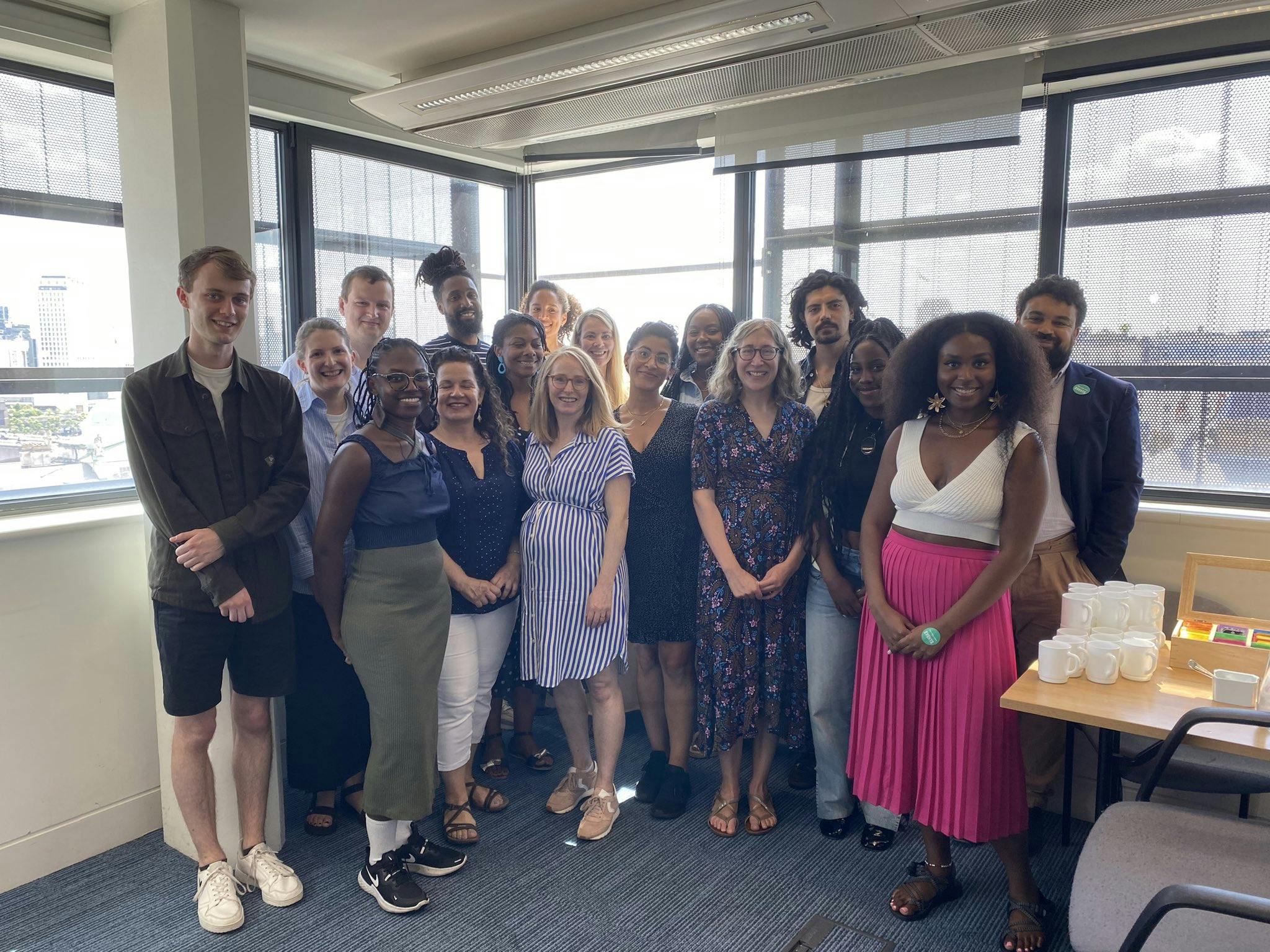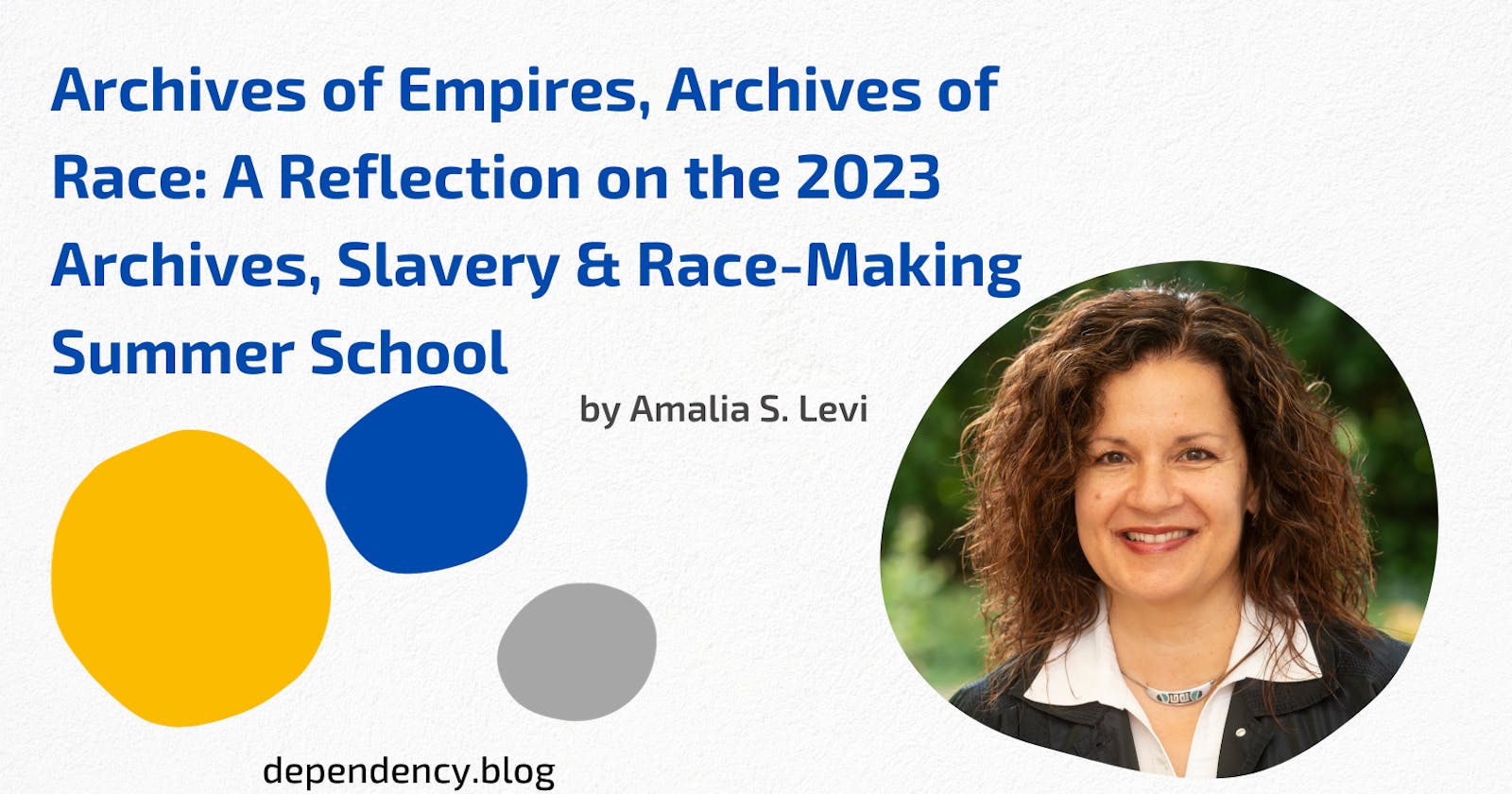Archives of Empires, Archives of Race: A Reflection on the 2023 Archives, Slavery & Race-Making Summer School
What’s better than a week in the archives? Of course, it’s a week talking about archives!
In July 2023, I participated in the Archives, Slavery & Race-Making Summer School, organized by the Centre for Early Modern Studies (CEMS) at King’s College London. The event was meant to introduce participants to new theoretical and methodological approaches to archives of slavery and race in the early modern world.

The 2023 Cohort of the “Archives, Slavery & Race-Making” Summer School at the Centre for Early Modern Studies (CEMS) of King’s College London (KCL)
Interrogating colonial archives and the knowledge production engendered within them is at the core of my doctoral research, and this summer school provided the space to reflect on my project in an intellectually stimulating environment.
The event was organized by Medicine and the Making of Race, 1440-1720 (MMoR), a research project at King’s College led by the Principal Investigator (PI), Dr. Hannah Murphy. It was open to Ph.D. students and early career researchers (ECRs) from any relevant discipline with a desire to workshop chapters from their dissertations or other projects.
The week-long summer school was split into morning sessions, comprising master classes with leading scholars and afternoon discussions of work contributed by the participants.
Research presented at the summer school covered varied topics, including, among others,
the process of progressive criminalization and segregation of enslaved Muslim street peddlers, part of seventeenth-century Genoa’s polyglot soundscape (Achille Marotta, University of Bologna)
the materiality and racial signification of the decorative figure of the ‘Moor’ in early modern Venice (Hannah Lee, Warburg Institute, SAS, University of London);
the materiality of records and record-keeping practices as a route to understanding the processes of racialization that forged an emerging British Empire (Jamie Gemmell, King’s College London)
record-keeping processes as revealing strategies and agency of enslaved people in Barbados for seeking and maintaining their freedom (Amalia S. Levi, BCDSS)
conceptions of home as a site of memory-keeping through material culture in Black women’s homes in nineteenth-century rural Indiana (Jazma Sutton, Miami University, OH);
the emotional stages of enslaved people through their encounters with European (Christian) rituals and processes along their journey to early seventeenth-century Cartagena de Indias (George Clay, Georgetown University)
the fragile spatial contours of freedom for free black mariners kidnapped in the Caribbean and trafficked in the nineteenth-century Gulf of Mexico (Zaria El-Fil, University of Chicago)
the ways men of African descent, in conditions of slavery, “legal” freedom, and marronage, navigated colonial civil and ecclesiastical institutions in early modern Venezuela (Andreina Soto, University of California, Santa Barbara);
the struggle between language and embodiment in the process of racialization and the construction of blackness in the Spanish theater in the seventeenth century (Jareema Hylton, Emory University),
knowledge production about the “Other” through the construction of blackness by an early sixteenth-century traveler to Yemen and within Yemen itself, from before Islam through the Rasulid and Tahirid dynasties (Lily Filson, Ball State University),
Jamaican Palenques’ use of marronage not only for resistance but also to negotiate freedom and belonging during the late seventeenth century (Clifton Sorrell, University of Texas at Austin)
and the ways apprenticed black mothers in Barbados encountered gendered violence and punishment but sought to undermine imperial penal policies in the nineteenth century (Halle-Mackenzie Ashby, Johns Hopkins University)
Master classes covered a range of topics, including gender and slavery in the Atlantic World, the Middle Passage, race and contemporary performance, sociological approaches to archives of slavery, and visual and material culture. Classes were led by leading scholars in their fields: Dr. Diana Paton, Dr. Stephanie Smallwood, Dr. Farah Karim-Cooper, Dr. Alexandre White, and Dr. Tamar Walker.
Lively discussions and activities were also facilitated by Dr. Hannah Murphy and her team, MMoR researchers Dr. Carolin Schmitz and Eli Cumings.
Being part of this interdisciplinary group of fellow Ph.D. students and ECRs was incredibly enriching, not only because of the thought-provoking nature of the seminars but especially due to the cross-pollination among the research projects. We all research different subjects covering different geographical and temporal aspects of the early modern world. As a result, we each came from different disciplinary backgrounds and used various methodological approaches to engage with archives of slavery that covered vast swathes of the globe. Discussions based on readings for each seminar, as well as our backgrounds, reflected the interdisciplinarity and transculturality of the gathering.
The starting point for our discussions was what has been revealed as the myth of the scarcity of archival materials for the study of slavery despite the abundance of data.
Colonial archives were archives of empires.
They hold massive volumes of data about the imperial project of the slave trade, but we must ask, what do these records convey if not information about the processes of coercion and enslavement, and the words of dominant voices that sought to turn human beings into slaves?
If in our research we do not foreground the fact that records of the actual execution of the slave trade, such as plantation ledgers and ship logs, can never help us recover voices that they were not meant to convey in the first place, we end up reproducing the worldviews of enslavers as factual data.
This challenge is exacerbated by the abundance of online material. The ease of access to digitized collections can be misleading if we do not ask fundamental questions about the nature of the materials we find online—and the infrastructure that supports them. Being mindful of the nature of online collections helps us discern the multiple processes that have shaped what is available on the internet and why. We start out with business records preserved in archives that already offer a skewed view of the world. Moreover, during the process of digitization, the silences within such records are compounded by human, technological, and socioeconomic factors.
What kind of evidence do we then access when we view archives online or visit them in former colonial metropoles? More importantly, whose evidence do we access?
Data extracted from colonial records that aimed to quantify and dehumanize people are neither objective nor neutral but, as Jessica Marie Johnson stresses, constitute evidence of terror.
Colonial archives do not mirror reality but enshrine particular worldviews. They silence some voices while amplifying others. In fact, even so seemingly innocuous an act as using the word “data” to describe evidence preserved in archives conceals the constructed and situated nature of available information. In place of the term “data,” which presumes neutrality, Johanna Drucker has proposed the term “capta,” which is information or knowledge that is actively taken or “captured.” The term capta should, indeed, be read in contrast with the word “data,” which is information that is presumed to be “given,” “recorded,” or “observed.”
Colonial data, or capta, were never apolitical: They have always been captured and produced to aid imperial expansion and settler colonialism. Data are never raw: The ways we collect, transmit, store, and use them define not only what they tell us but the very questions we ask of them.
Moreover, the databases we build and use today do not mirror analog collections. Due to time, resource, staffing constraints, the limitations of interfaces and search boxes, and archival practices, digital archives can offer an even more selective view of available information. In turn, digital tools that facilitate our scholarly work shape the questions we can ask, the results we get, and, eventually, the knowledge we produce. Carbajal and Caswell emphasize that understanding these processes can help us do history—particularly digital history—better.
Readings for the seminar highlighted different methodological approaches for engaging with slavery’s archives.
Focusing on the social life of records—their creation, retention, and eventual preservation—can help us critically approach the information we find in archives.
By inverting our gaze to read material counterfactually, we can go beyond a normative understanding of records and challenge the epistemology and dominant worldviews expressed in colonial archives.
This kind of historiography disrupts the naturalization of the violence we encounter in colonial documents. As Stephanie Smallwood suggests, a counter-history is accountable to the enslaved and allows us to see “the inner workings of power and violence.”
Other scholars use colonial documents as a starting point for locating transnational networks of people who have otherwise left no first-hand accounts. These networks forged vibrant transatlantic communal and cultural ties and new social identities not through written records but through the purposeful circulation and consumption of material culture, as Mary E. Hicks demonstrates in her analysis of West African textiles.
Overcoming the coloniality of records and historical methodologies defined by imperial boundaries and repositories is crucial for uncovering stories and experiences that often elude us. Seeking to convey such experiences, some scholars weave together records from disparate archives, as Elise Mitchell expertly does, to produce microhistories, or, more accurately, series of connected microhistories over long, arduous journeys—of lives lived at the intersection of histories of gender, disease, and the slave trade.
These wide-ranging theoretical and practical reflections helped me further refine my dissertation project, but beyond the readings and the discussions around them, I enjoyed the process of discussing each other’s papers, even when a presentation seemed to deal with topics that were far removed in time and place from my own research.
Witnessing how other participants deal with limited and fragmentary sources was particularly eye-opening. I was especially impressed with how people used diverse lenses like material culture, history of emotions, memory-keeping practices of descendant communities, embodied and sensory aspects of race-making, mobility studies, and close and distant reading of record-keeping practices. Receiving thoughtful and informed feedback on my chapter was also a rewarding experience since it pointed my attention to topics I can further develop and points that need further clarification.
It was truly an honor to participate in the 2023 Archives, Slavery and Race-Making Summer School, which was so wonderfully organized by the MMoR team. I am thankful for the opportunity to have been a part of it.

